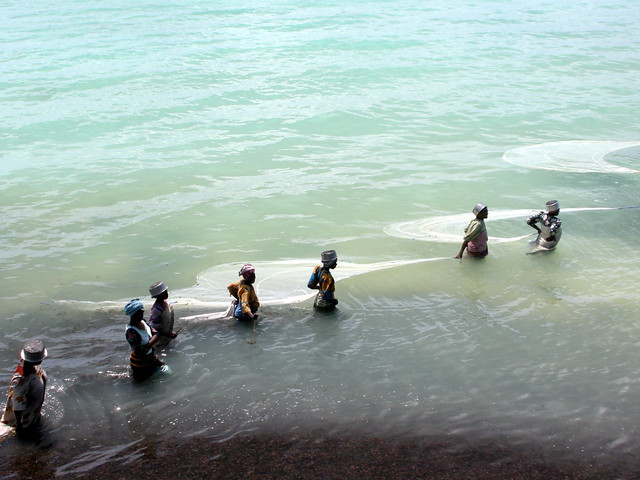Conserving the Ocean with Rare’s Fish Forever
 Environmental conservation is an often-forgotten aspect of reducing global poverty and providing sustainable income for coastal communities. Conserving the ocean has become an even more pressing issue now because of overfishing. However, one company is putting this at the forefront of their work. Rare’s Fish Forever campaign is working to end the unprecedented endangerment of our coastal waters and protect the families who depend on them.
Environmental conservation is an often-forgotten aspect of reducing global poverty and providing sustainable income for coastal communities. Conserving the ocean has become an even more pressing issue now because of overfishing. However, one company is putting this at the forefront of their work. Rare’s Fish Forever campaign is working to end the unprecedented endangerment of our coastal waters and protect the families who depend on them.
What Is Rare’s Fish Forever?
Founded in 1995 by Brett Jenks, Rare is an organization with a focus on conservation as a means to protect the world’s most vulnerable people and ensure that the wetlands, forests and oceans they depend on continue to thrive. Fish Forever is a campaign that targets coastal revitalization and conserving biodiversity along coastlines through bottom-up solutions. Jenks says, “The aim isn’t to teach a community to fish; it’s to help ensure they can fish forever.” Ensuring a future for these coastal communities relies on sustainable fishing practices.
Rare’s Fish Forever campaign uses community-led initiatives to provide solutions to issues like overfishing and coastal mismanagement because it empowers local populations and incentivizes future compliance with new regulations. These local people work with all levels of their government to come up with solutions that fit their unique situation. Active in Brazil, Indonesia, the Philippines, Belize and Mozambique, Rare’s Fish Forever acts as a guide for communities while also providing tools the improve the data needed for these countries to make informed decisions.
Fish Forever in Mozambique
Mozambique is an African country with more than 1,500 miles of coastline, sustaining millions of people. Half of the population lives on the coastline in fishing communities. In fact, the economy is largely dependent on fisheries, particularly small-scale or artisan fisheries. Almost 85 percent of all fish caught in Mozambique are done so on a small-scale. Communities such as those in the Nampula, Sofala, Inhambane, Maputa and Cabo Delgado regions are good candidates for Rare’s Fish Forever solutions because they are home to most of the small-scale fisherman.
The country’s coastline is very diverse, second only to the Coral Triangle. However, due to climate change and unregulated fishing, the size of the fish catches has declined. In the last 25 years, small-scale catch sizes have declined 30 percent, and it is continuing to decline. Additionally, fisherman asserted that some species of fish had all-together disappeared. Climate change would only worsen these issues, so Rare’s Fish Forever worked with communities to come up with solutions to this threat. Together with Rare’s Fish Forever program, communities came up with four broad solutions to revitalize coastlines, protect biodiversity and ensuring sizeable fish catches for families.
- First, they decided to adopt government frameworks to better regulate fishing behaviors and make fishing more sustainable.
- Then, they built and strengthened community-based management of coastal fisheries.
- Thirdly, communities established fishing areas with managed access – places where fishing was prohibited or limited – and provided social and economic benefits to communities who abided by these rules.
- Lastly, they made environmental conservation more of the social norm through education and marketing campaigns.
All in all, Mozambique is on its way to recovery. With more than 100 organizations and institutions supporting Rare’s Fish Forever program, the country’s coastal waters and fishing communities are in good hands. That means a higher chance of conserving the ocean.
Rare’s Fish Forever in the Philippines
Coastal communities in the Philippines face the same sorts of issues as those in Mozambique. Looc Bay is a beautiful location that is home to many communities and attracts its fair share of tourists. Unfortunately, a combination of overfishing by local fisherman and environmental degradation from irresponsible tourism have caused a significant decline in the fish populations. This has only been accelerated by climate change.
The communities in the area have always been wary of external intervention. Their greatest worry when initially approached by Rare’s Fish Forever program was that coastal management would restrict fishing to a point that families could no longer sustain themselves through small-scale fishing. This distrust was fortunately misplaced.
Today, more than 4.4 square miles of coastal waters have been declared as Managed Access Areas and sanctuaries. These protected critical habitats require exclusive clearance, which is only granted to fisherman who comply with sustainable practices. To date, more than 800 fishermen have been granted exclusive access area, meaning that they are also faithful practitioners of sustainable fishing.
Jose Ambrocio, the Looc Municipal Councilor and chairperson of the Agricultural and Environmental Committee, has noted that “With Rare’s Fish Forever program, we are working to balance the economic needs of the people and the need to conserve the resources for the future generation.”
By challenging communities to develop their own solutions, Rare’s Fish Forever program is sustainable and empowering. Through this program, and programs like it, more sustainable fishing practices can be put into place, thus working towards a better future by conserving the ocean.
– Julian Mok
Photo: Flickr
